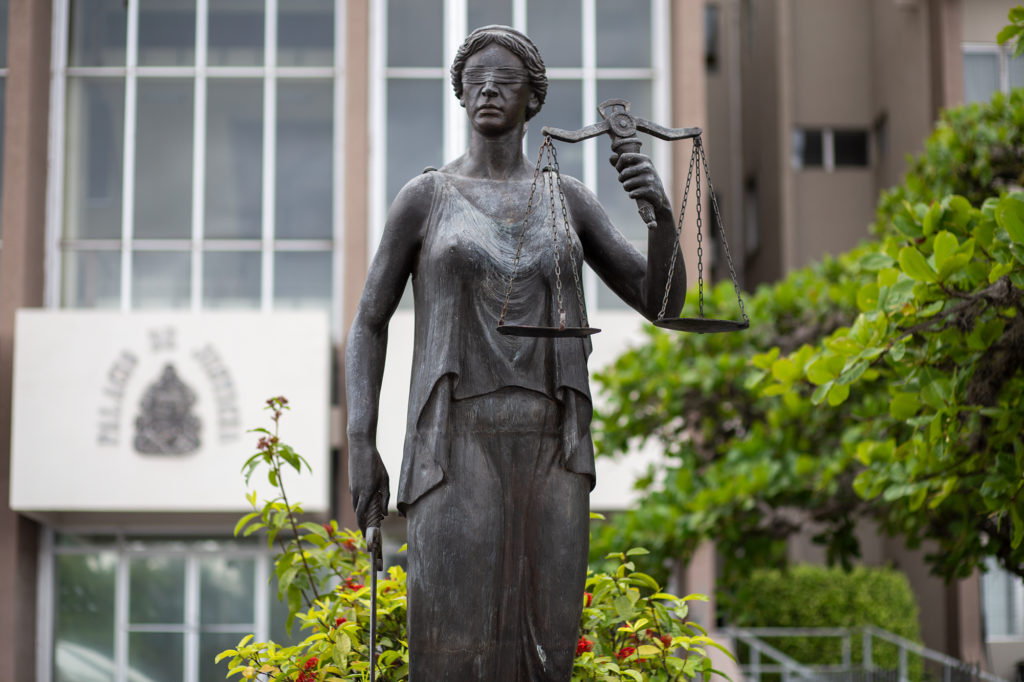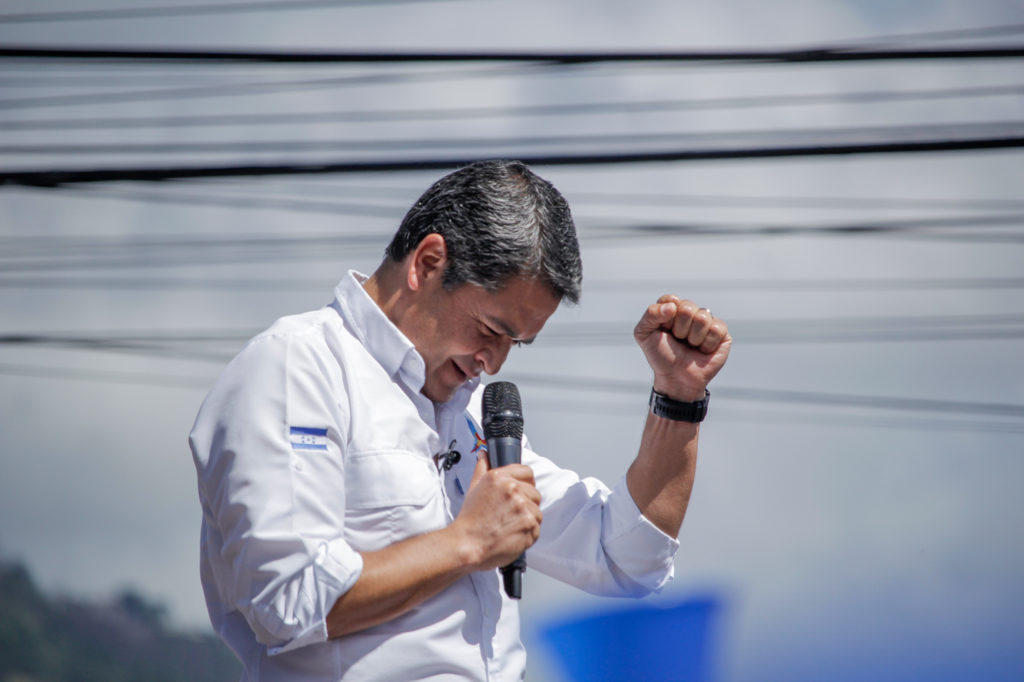The Inter-American Court of Human Rights opposes unlimited presidential reelection limits on the grounds that it violates the American Convention and the American Declaration. Dr. Joaquín Mejía says that the Supreme Court justices who ruled in favor of this practice should be criminally investigated, and that President Juan Orlando Hernández’s reelection was illegitimate. Mejia believes that Honduras’ Supreme Court should reverse this ruling and reestablish presidential term limits.
By Leonardo Aguilar
Photos by Martín Cálix
The Inter-American Court of Human Rights (I/A Court H.R.) recently issued an advisory opinion concluding that unlimited presidential reelection is not an autonomous human right, according to an August 13 press release. The I/A Court H.R. is an autonomous legal institution established by the Organization of American States (OAS) and located in San José, Costa Rica.
Several Latin American countries have cited human rights principles to justify unlimited presidential reelection. However, the I/A Court H.R. stated in its advisory opinion that “unlimited presidential reelection is recognized neither in the American Convention, nor in the American Declaration, nor generally in the body of international human rights law, international treaties, regional custom, or general legal principles.”
The Court’s advisory opinion (not available in English) published on June 7, states that “term limits aim to ensure that different political parties or ideological movements can access the exercise of power, highlighting the essential role of political groups and parties in the development of democracies.”
One of the first to react to the court’s advisory opinion was Juan Jiménez Mayor, the former head of the now defunct Support Mission Against Corruption and Impunity in Honduras (Misión de Apoyo Contra la Corrupción y la Impunidad en Honduras – MACCIH). Jiménez claimed that Nicaragua, Venezuela, Bolivia and Honduras have all used flawed court decisions rulings to permit unlimited reelection.
Presidential reelection had been prohibited in Honduras since 1982 by an immutable constitutional clause until the Supreme Court of Justice’s Constitutional Chamber issued a ruling in April 2015 allowing this practice. This move came after the Honduran National Congress unconstitutionally dismissed four of the five justices of the Constitutional Chamber on December 12, 2012.
Dr. Joaquín Mejía Rivera, a human rights expert and member of the Jesuit social research organization called ERIC (Equipo de Reflexión, Investigación y Comunicación de la Compañía de Jesús), says that the advisory opinion issued by the I/A Court H.R. reveals how the Honduran Supreme Court was manipulated to rule in favor of President Juan Orlando Hernández’s 2017 reelection.
Mejía alleges that the Supreme Court lied when it argued that reelection should be allowed because bans on reelection violate political rights. “This ruling by the Supreme Court was a de facto amendment of an immutable clause of the constitution! The Supreme Court claimed that the Honduran Constitution cannot prohibit presidential reelection because it is a human right. Worst of all, the Supreme Court’s ruling stated that reelection is recognized in international human rights principles and norms, which is an absolute disgrace,” says Mejía.
Dr. Mejía, who coordinated a 2018 publication analyzing the constitutional and human rights elements of presidential reelection in Central America (La reelección presidencial en Centroamérica: ¿Un derecho absoluto?), claims that the Honduran Supreme Court’s ruling in favor of reelection was based on a lie.
“The Inter-American Court has just says no⎼⎼presidential reelection is not a human right. It’s advisory opinion refutes the Honduran Supreme Court and unequivocally establishes that no international human rights treaty recognizes the autonomous right to be reelected president,” he says.
Mejía says that the I/A Court H.R. affirms the human right to elect and to be elected. But once an individual has been elected to public office, their political rights have been exercised. Thus, reelection is simply a modality that must be regulated in accordance with historical, social and cultural needs, as Honduras did when it recognized its historical needs in the constitutional ban on reelection.
“The historical needs of Honduras are such that reelection was banned to avoid the types of dictatorships and authoritarian governments we’ve had in the past. In other words, this regulation prohibiting reelection is based on the country’s own historical, political, social and cultural needs.” (Dr. Joaquín Mejía).
The advisory opinion issued by the I/A Court H.R. responded to a request submitted by Colombia, and the reelections of presidents in Nicaragua, Venezuela, Bolivia and Honduras.
“Nicaragua, Honduras and Bolivia amended their constitutions based on court rulings, to allow incumbent presidents to be reelected. The case of Honduras is even more egregious since the reelection ban was established in an immutable constitutional clause, which cannot be amended by any branch of government⎼⎼executive, legislative, or judicial. But they changed it anyway. That clause can only be modified by the Honduran public through a voting process,” says Mejía.
Scope of the advisory opinion
Four of the five Supreme Court justices in the Constitutional Chamber were dismissed by the National Congress in 2012 after they ruled that a proposed law was unconstitutional because it violated national sovereignty. This law would have seen the establishment of Model Cities in Honduras, which later evolved into the current Employment and and Economic Development Zones (Zonas de Empleo y Desarrollo Económico – ZEDE). The dismissal of the Supreme Court justices was viewed as a coup d’état by the legislative branch against the judicial branch. The only Supreme Court justice not dismissed had expressed approval of the proposed Model Cities law. This was Oscar Fernando Chinchilla, the current Attorney General of Honduras.
Mejía believes that the advisory opinion has two very clear repercussions. First, if Hernández’s 2017 reelection was based on a legal decision that itself was based on a lie, then his reelection was illegal and his current de facto government is illegitimate. “And if that legal decision was based on a lie, then they [the Supreme Court] committed treason. If Oscar Chinchilla truly functioned as an independent attorney general, criminal charges would be brought against these Supreme Court justices,” Mejía says.
Second, the advisory opinion should have a preventive effect. The I/A Court H.R. has two functions. One is to adjudicate disputes and issue sentences. It also interprets the American Convention on Human Rights and issues advisory opinions as it did with the reelection issue.
Mejia says the purpose of this function is “to warn signatory states not to do things that run contrary to our advisory opinions. In this case, the advisory opinion states that reelection is not a human right, so stop trying to amend constitutions through legal decisions that allow reelection based on arguments that it is a human right, when these constitutions themselves are not human rights.”
Mejía thinks that the new Constitutional Chamber of the Honduran Supreme Court should reverse its de facto constitutional amendment, “In a sensible country, everything that Juan Orlando Hernández has done [since reelection] would be considered illegal and worthless because he leads a de facto regime⎼⎼this is a very important point. One would certainly expect a criminal investigation of these barbarians who issued a ruling benefitting a dictator and didn’t care that it was all based on a lie.”
The justices that allowed reelection have all completed their terms on the Supreme Court. In 2016, the National Congress appointed the 15 current Supreme Court justices, whose terms expire in 2023. This congress held a controversial vote to appoint these justices after the initial list of candidates nominated for the Supreme Court did not garner the required 86 votes to pass. However, the National Party, with 48 of 128 total votes, struck alliances with other political parties and succeeded in appointing a Supreme Court that favored its interests.
President Juan Orlando Hernández should have ended his term on January 27, 2018 and made way for a new president. However, he was reelected in 2017 amid allegations of fraud by Salvador Nasrallah, the Alliance against Dictatorship candidate, who’s popularity had been surging.
What is happening in Central America?
On August 13, Salvadoran president Nayib Bukele proposed a bill to extend the president’s term of office from five to six years. The bill also proposed extending the terms of the attorney general, Supreme Court justices, and the Supreme Electoral Tribunal from three to six years.
“What’s happening in the region is terrible. The worst part of it all is that not only are constitutions being violated, but those in power are taking advantage of the situation to change the rules of the game and to benefit from the power they currently hold,” says Mejía.
He believes that Central America is experiencing a pattern of “authoritarian rulers who have changed the rules and are using their power to keep feeding at the government trough by controlling the country’s institutions. They have turned Honduras into a dictatorship and a narco-state.”
Protests against the 2017 electoral fraud and the unconstitutional reelection of President Hernández left at least 20 people dead, most of them shot by police and military forces. The president has been named in several New York trials for his ties to drug trafficking. His brother, former National Party congressperson Antonio Hernández, was sentenced by a U.S. court to life in prison plus 30 years after being found guilty of large-scale drug trafficking.







